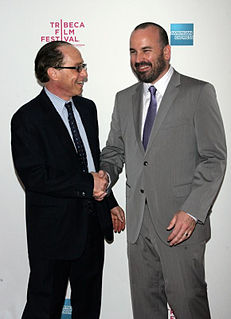A Quote by Marvin Ammori
In the early 1990s, Americans used their home phone lines to connect their desktop computers to the Internet via ISPs like AOL, Earthlink, or Netzero. Back then, the ISPs didn't have cost-effective technology to select particular sites for blocking or privileging.
Related Quotes
Some ISPs are blocking all BitTorrent traffic, because BitTorrent can be used to share files in a piratical way. Hollywood lobbying groups are trying to pass laws which would force ISPs to block or degrade BitTorrent traffic, too. Personally, I think this is like closing down freeways because a bank robber could use them to get away.
Before I became the president of AT&T's consumer division, I was running strategy and our internet services, so I was the president of one of the first internet service providers, ISPs, AT&T Worldnet, and running our internet protocol product development as well. So I knew a lot about what was going on with the internet.
Bob Mueller for the FBI, myself, met with a particular group of executives that have major roles in the so-called ISPs, the Internet service providers, what they could possibly do. We have met with leaders in private industry in terms of the core critical infrastructure of the country as to what they can possibly do with cyber-attacks.
The Internet is the first technology since the printing press which could lower the cost of a great education and, in doing so, make that cost-benefit analysis much easier for most students. It could allow American schools to service twice as many students as they do now, and in ways that are both effective and cost-effective.
The notion of the Internet as a force of political and social revolution is not a new one. As far back as the early 1990s, in the early days of the World Wide Web, there were technologists and writers arguing forcefully that the Internet was destined to become the most important tool for cultural change in human history.
The dynamic is unmistakable: fixed lines for phones have been declining at a three-percent rate for the last several years, while the number of Americans opting for cell phone calling keeps increasing. If you are a fixed line provider this trend means trouble. Many of the fixed mobile convergence strategies under consideration end up utilizing a smart phone or dual-mode VoWLAN/Cellular phone that works like a landline phone in the local area and then converts to cell phone calling.


































